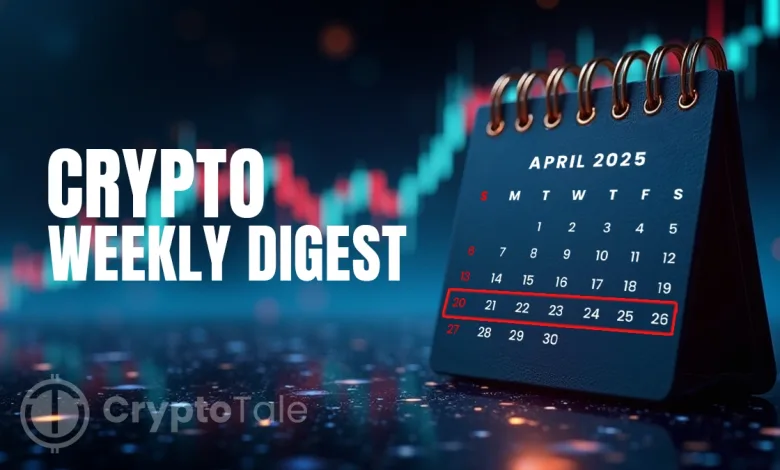Crypto Weekly Digest April 28: Bitget Faces Heat Over VOXEL Futures Surge

Hey folks! Welcome to the latest edition of the Crypto Weekly Digest, where we shed light on the significant developments that took place in the crypto world over the last week. The week started on a turbulent note as Bitget found unusual trading activity around the VOXEL/USDT perpetual futures contract, linked to the Polygon-based RPG, Voxie Tactics.
According to Bitget’s official announcement, between 8:00 and 8:30 UTC on April 20, 2025, trading volume for VOXEL/USDT skyrocketed by over 138%, triggering the exchange’s internal risk controls. At its peak, VOXEL even momentarily overtook Bitcoin in trading volume, with VOXEL futures hitting an astonishing $12.7 billion in 24 hours, compared to Bitcoin’s $4.76 billion. Despite this surge, CoinMarketCap data indicated that VOXEL, after reaching a peak of $0.1645, had cooled to $0.08111, still reflecting a whopping 233.69% increase.
Following up on its stolen funds, Bybit CEO Ben Zhao stated that 68% stolen funds are traceable. In his X post, Zhao further stated that 27.59% has disappeared into anonymity while 3.84% has been successfully frozen. Despite hackers employing sophisticated laundering tactics like mixers, cross-chain bridges, and OTC fiat trades, the partial traceability of the funds offers a glimmer of hope for eventual recovery.
Related: ruya Becomes First Islamic Bank to Offer Bitcoin Access
Switching gears to new ventures, Grayscale has expanded its horizons by launching the Grayscale Decentralized AI Fund on April 21, targeting accredited investors eager to capitalize on the intersection of AI and blockchain. The fund provides diversified exposure to top decentralized AI projects, including NEAR Protocol, Bittensor (TAO), Render, Filecoin (FIL), and The Graph (GRT), with each project playing a critical role in areas such as computational power, storage, and decentralized indexing.
On the regulatory front, the U.S. Securities and Exchange Commission (SEC) witnessed a major leadership change with the swearing-in of Paul Atkins as chairman. Backed by President Donald Trump and the Senate, Atkins declared that his top priority would be making the U.S. the global leader in digital assets and crypto innovation. His appointment coincides with rising pressure on the Federal Reserve to slash interest rates, setting the stage for sweeping changes in financial and crypto market policy.
Meanwhile, the Federal Reserve made waves by withdrawing its restrictive guidance on crypto-asset and dollar token activities for banks. Originating from a 2022 supervisory letter and 2023 joint statements with the FDIC and OCC, the guidance previously forced state member banks to seek prior approval for crypto dealings. Its removal marks a notable pivot toward a more open and crypto-friendly banking framework.
President Trump struck a hopeful tone on trade, hinting that the controversial 145% tariffs on China could be significantly reduced. Speaking from the Oval Office, he emphasized that tariffs “won’t be anywhere near that high,” suggesting room for de-escalation after months of retaliatory measures between the two superpowers, including China’s 10% levy on U.S. crude oil and agricultural machinery imposed earlier this year.
On the other hand, an FBI report revealed that Americans lost an astonishing $9.3 billion to crypto-related scams in 2024. The surge in fraud highlights the dark side of digital asset expansion and the growing sophistication of cybercriminal tactics, putting enormous pressure on regulators and industry leaders to fortify consumer protection measures swiftly.
Making a strategic move, Russia announced plans to launch a state-backed cryptocurrency exchange specifically for ultra-high-net-worth individuals. Developed jointly by the Ministry of Finance and the Central Bank under the Experimental Legal Regime (ELR), the platform aims to regulate and legalize crypto trading for a select group while testing financial innovations in a controlled three-year environment, as confirmed by Finance Minister Anton Siluanov.
Related: University of the Hespérides Opens Bitcoin Master’s Program
As the week closed, DeFi Development Corp., formerly known as Janover Inc., filed an S-3 registration statement with the SEC to raise $1 billion, mainly to spend on SOL as part of its treasury strategy. Already having raised over $42 million in convertible notes and warrants, the firm had plans to not only acquire Solana tokens but also operate Solana validators, replicating the strategy employed by Strategy (formerly MicroStrategy) with Bitcoin.




